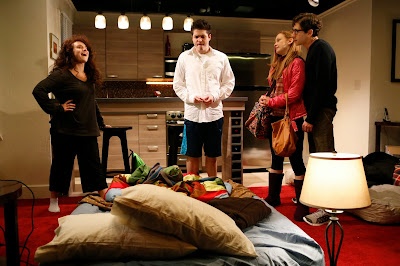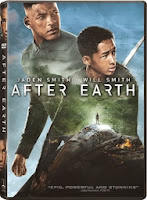- Details
-
Parent Category: Film and the Arts
-
Category: Reviews
-
Published on Monday, 21 October 2013 03:15
-
Written by Kevin Filipski
Corruption
(Grindhouse Releasing)
This sleazy 1968 thriller morphs from a swinging London movie into a bizarre serial killer movie after a middle-aged surgeon’s beautiful model wife is disfigured in a freak accident: he stalks unsuspecting young women whose skin he needs to graft onto her hideously burned face.
As nuts as it sounds, there’s little actual gore; a weirdly insane finale and over-the-top performances by Peter Cushing and Sue Lloyd make this a frightfully fun 90 minutes. The Blu-ray transfer looks quite good; extras include alternate scenes, interviews, commentary and two versions of the film, one bloodier than the other.
(Fox)
Melissa McCarthy cursing like a truck driver is as unappealing as it gets, and this scattershot, incredibly bloated—especially in its extended version—buddy comedy follows suit.
Unlike McCarthy telegraphing each joke, Sandra Bullock is a smartly restrained straight man, but that’s no compensation for two hours of bad-taste, unfunny one-liners. The Blu-ray looks excellent, at least; extras include deleted/extended scenes, bloopers, featurettes and five—count ‘em—commentaries.
A Hijacking
(Magnolia)
Unlike the star-laden Captain Phillips, this taut Danish thriller slipped under the radar; everyone who saw heroic Tom Hanks should watch a superior drama which doesn’t rely on star power.
Director Tobias Lindholm powerfully shows everyone’s gradual deterioration over the course of drawn-out negotiations between Somali pirates and the head of the Danish shipping company whose vessel they seized. Magisterial acting (Soren Malling, Pilou Asbek and Dar Salim are from the great Danish TV series Borgen) keeps nerves frayed throughout. The Blu-ray image is lustrous; extras include featurettes.
and The Stranger
(Kino)
Ida Lupino’s tense 1953 noir The Hitchhiker—which pits a ruthless killer (William Talman) against two men he kidnaps (Edmond O’Brien and Frank Lovejoy)—is trashy but effective pulp that, at a fleet 71 minutes, never overstays its welcome.
Orson Welles’ The Stranger (1946), a crackerjack thriller about a Nazi hiding in plain sight in small town America, wraps everything into a satisfying knot at the end. The Blu-ray transfers are decent but imperfect; Stranger extras include a concentration camp short, audio commentary and Welles’ wartime radio broadcasts.
(Warner Archive)
This lumbering, fitfully entertaining musical is set in a circus—Jumbo is the elephant—but its main claim to fame is a selection of wonderful Rodgers and Hart songs.
For over two hours, Jimmy Durante, Doris Day and Martha Raye try their best to put this treacly material over, and occasionally succeed; director Charles Walters’ heavy hand is nearly fatal, while Busby Berkeley’s elaborate circus sequences are nowhere near his best. The hi-def transfer is splendid; extras include a musical short and cartoon. (available through WarnerArchive.com)
Maniac
(IFC)
This blood-drenched remake of a 1980 slasher flick—itself forgettable—has one borrowed idea: the entire action is from the point of view of its murderous protagonist (played by a zombified Elijah Wood, whom we see when his character looks in the mirror), but that’s about it for director Franck Kalfoun’s originality.
If you want to see unsurpassed gore, from sticking a knife through a woman’s throat to carving off young ladies’ scalps, then this is the demented movie for you. Why such a winning actress like Nora Arnezeder would appear in this is a condemnation of decent roles for women. The Blu-ray image is crisp and clear enough to wallow in the gruesome bloodlettings in rich HD; extras include Wood and Kalfoun’s commentary, deleted scenes, an hour-long making-of.
(Fox)
It played on Broadway five years ago, so this release of the musical based on the beloved William Steig book and subsequent movie franchise is belated to say the least. The hit-or-miss show has cute if forgettable songs by Jeanine Tesori and a campy book by David Lindsay-Abaire.
But it’s the cast that shines: Brian D’Arcy James’ Shrek, Daniel Breaker’s Donkey, Christopher Sieber’s Lord Farquaad and—most memorably of all—Sutton Foster’s touching and funny Princess, the best thing about this watchable knock-off. The Blu-ray looks fine; extras include short featurettes.
Superheroes—A Never-Ending Battle
(PBS)
In this detailed chronicle of America’s greatest contribution to pop culture—comic books—the history superheroes from Superman’s birth during the rise of 1930s European fascism, is recounted up to current CGI-dominated movies.
Narrated by the ubiquitous Liev Schreiber, the three-part program comprises interviews with so many experts and historians that it’s no surprise the extras feature more interviews taking up another 40 minutes. The Blu-ray image looks stellar.
Vikings—Complete 1st Season
(MGM)
In this impressive-looking dramatic series, the legendary warriors and explorers who bravely left the comforts of home for unknown lands get television’s usual melodramatic treatment, with copious sex and violence overshadowing credible characterizations.
Visual design and the actors are first-rate; far less compelling is a lack of an original point of view. The hi-def transfer is ravishing to the eye; extras include deleted scenes, commentaries and interviews.
After Earth
(Sony)
This sour, humorless piece of sci-fi is the ultimate vanity project: Will Smith is not only credited with the (vapid) story but stars with his teenage son Jaden as a father-son team that crash-lands on an uninhabited earth, with the wounded dad guiding his willful son to success and survival against various obstacles and creatures.
As a half-hour Twilight Zone episode, it would barely pass muster, but at 100 minutes, as nominally directed by M. Night Shyamalan and badly acted by Smith pere and fils, this is impersonal Hollywood moviemaking at its most ludicrous. Extras include self-congratulatory featurettes.
(Warner Archive)
This very mild satire about the morality of murder was directed without much distinction by veteran Basil Dearden.
In fact, for a movie made in 1968, featuring a fairly interesting cast (Oliver Reed, Telly Savalas, Diana Rigg), set in enticing European locales and climaxing with a sword fight aboard an airborne dirigible, this mostly forgettable movie remains unfocused on what it wants to scatter its shots at. (available through WarnerArchive.com)
Deep Purple—Perfect Strangers
(Eagle Vision)
When the best-loved Deep Purple lineup reformed in 1984 for its Perfect Strangers album, the band embarked on a worldwide tour, and this two-hour Australia performance shows them at the peak of their considerable hard rock powers.
Along with the title track and other tunes from that album (which sounds dated thanks to the era’s processed guitar sound), the group also barnstorms through classics like opener “Highway Star” and inevitable closer “Smoke on the Water.” Included is a featurette about the album and tour.
(Millennium)
Emily Browning, who’s shown an ability to outclass her material in such middling items as Sleeping Beauty and Sucker Punch, does it again in this tepid thriller about a rock star who falls for a bad boy guitarist with a past.
Director Catherine Hardwicke, who made Thirteen and a little something called Twilight, seems unsure whether to go for full-on thrills or make it campy, with the result neither scary nor humorous. Browning’s sexy heroine helps, but not enough. Extras include videos and extended musical sequences.
(PBS)
This attractive compendium of the enlightening PBS series about New York City area attractions comprises seven episodes, showing off the Park Avenue Armory, New-York Historical Society, Hearst Tower, Roosevelt House, Pratt Institute, New York Botanical Garden and American Museum of Natural History.
The series, which is continuing this season with new programs about the Saratoga Race Track (not really near NYC) and Four Freedoms Monument on Roosevelt Island, is a must-watch travelogue.
With Love…From the Age of Reason
(First Run)
In this relentlessly cutesy comedy, Sophie Marceau tries to keep her head above water as a single-minded career woman who learns what’s important in life when she gets letters from her seven-year-old self on her 40th birthday.
Yann Samuell’s mediocre movie goes exactly where you expect, and despite Marceau investing her character with as much emotion as possible, there’s little she can do to elevate this above the passable.
Leos Janacek—The Piano
(Allegro)
It’s always heartening when a master composer best known in one genre—Janacek’s operas, from Jenufa and Kata Kabanova to The Makropulos Case and The Cunning Little Vixen, are among the 20th century’s greatest—is spotlighted in another, like this first-rate two-disc set of Janacek’s solo piano works by Luxembourg-born Cathy Krier.
Along with a few immature early works, masterpieces like his piano sonata (titled 1.X.1905) and the suites In the Mists and On an Overgrown Path are played by Krier with lilting gracefulness. This is the first standout traversal of Janacek’s piano music since Andras Schiff nearly 20 years ago.
Krzysztof Penderecki—Piano Concerto (Resurrection)
(Hanssler Classic)
When Penderecki’s piano concerto Resurrection premiered in 2002, it was criticized for exploiting the horrific events of September 11 (hence its subtitle). Whether or not that was the reason, a revised version was premiered five years later; this recording, with Florian Uhlig dazzlingly playing the demanding piano part, allows the work to breathe on its own without any 9/11 baggage.
Penderecki's score, which moves restlessly from dark tragedy to majestic light, is given a towering performance (the Polish Radio Symphony Orchestra plays magnificently under conductor Lukasz Borowicz) that propels it to the top of anyone's list of memorable 21st century works.





























